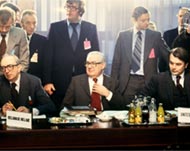Former British PM Callaghan dies
Lord Callaghan of Cardiff, the former British prime minister, has died on the eve of his 93rd birthday.

The affable, self-educated sailor’s son who rose from poverty, died at his family home in East Sussex county on Saturday, 11 days after the death of his wife. The cause of death was not given.
Callaghan, who entered parliament in the Labour Party landslide of 1945, was the only British politician to hold, at different times, the four top posts of prime minister, treasury chief, foreign secretary and home secretary.
He succeeded Harold Wilson as prime minister in April 1976 and governed until May 1979, when strikes, financial crises and party divisions lost him the election against Margaret Thatcher’s Conservative Party.
Thatcher remembered Callaghan as “a formidable opponent”.
“In other circumstances he would have been a successful prime minister,” she said on Saturday. “He was a superb party manager. Despite our disagreements, I always respected him because I knew he was moved by deep patriotism.”
A patriot
Prime Minister Tony Blair said he had sought Callaghan’s advice many times “and found his judgment and common sense invariably sound”.
“He was a patriot, a loyal servant of party and country and a devoted husband and father,” Blair said.
“In other circumstances he would have been a successful prime minister. He was a superb party manager. Despite our disagreements, I always respected him because I knew he was moved by deep patriotism” Margaret Thatcher, Callaghan’s successor as prime minister |
The ascent of “Sunny Jim” to become the country’s fourth Labour prime minister took a combination of stamina, unflappability and an instinct for the middle road.
The stooped, bespectacled man was 64 when he inherited a quarrelling party barely clinging to a parliamentary majority, and an economy battered by double-digit inflation, rising wages and a plummeting pound.
Many saw Callaghan as simply a caretaker, minding the store until the Conservatives moved in with their free-market, union-bashing doctrines.
Yet in two years, helped by the North Sea oil bonanza and $4 billion in bailout loans, sterling recovered, inflation retreated to single digit and most workers voluntarily restrained wage demands.
Winter of discontent
Callaghan approached the 1979 election running neck-and-neck with the Tories.
But in late 1978 the unions, fed up with wage restraints, launched their “winter of discontent”. Strikes left bodies unburied, garbage uncollected, trains paralysed, cancer patients without hospital care, and children locked
out of classrooms.
 |
|
Tony Blair often sought advice |
Callaghan seemed aloof. Returning from a summit in the Caribbean, he remarked: “I do not feel there is mounting chaos.”
It was not what the public wanted to hear, and Thatcher ousted Callaghan the following year with a comfortable majority.
Abroad, Callaghan sought to align British interests with Washington’s rather than Europe’s, and to maintain nuclear deterrence while working for arms control.
At home he sought to safeguard Labour’s alliance with its chief financial backers, the unions.
War service
Callaghan was born in the southern port city of Portsmouth, to a Catholic father and Baptist mother.
|
“He had an extraordinary genius for identifying the things that mattered most and then getting the Cabinet, sometimes against its will, to take the right decisions on them” Lord Denis Healy, |
His father died when he was nine, plunging the family into poverty. They received no pension until Labour came into office in 1931 and paid families like the Callaghans a weekly pension of about $2. “After that we were Labour for life,” he recalled.
After school, he went to work in a tax collection office and became involved in union affairs.
He married fellow teacher Audrey Moulton in 1938, and served in the navy during the second world war.
As treasury chief, he refused to devalue the pound and was proved right.
In 1969, he acceded to Catholic appeals to send the army into Northern Ireland to protect them against Protestant mobs, but warned: “I can send the army in, but I’ll have the devil of a time getting it out again.” The troops are still there.
Socialism
After Wilson’s sudden resignation in 1976, the party chose Callaghan as its leader, given his good record in union politics. His moderate socialism, however, often infuriated colleagues.
Callaghan insisted he was as good a socialist as any. “I hate injustice,” he said. “I’ve known it from the worm’s eye view.”
 |
|
Callaghan (C) aligned the UK with |
Former cabinet colleague Lord Denis Healy said on Saturday: “He was very much better as a prime minister than in any of the other cabinet jobs he had before that.
“He had an extraordinary genius for identifying the things that mattered most and then getting the cabinet, sometimes against its will, to take the right decisions on them.”
In 1980 Callaghan gave up the party leadership to Michael Foot, and in 1985 resigned from parliament and was elevated to the House of Lords.
He is survived by a son and two daughters. Funeral details were not immediately available.